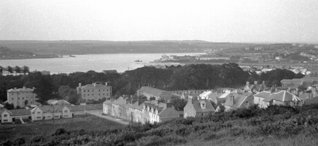Your
Memories of Pembroke Dock at War!
|
In the Spring of 2011, ITV Wales produced a Documentary about the bombing of various towns in Wales during the early 1940’s. One of the events featured in the programme was the ‘Bombing of the Oil Tanks’ at Llanreath, Pembroke Dock. We put a link to the programme on The Penvro site and many people wrote to us with their own memories of those days. and here now are all the accounts we have received to date. We’ll be pleased to add your war-stories to this section, so send them in!
|
Introduction: by Phil Carradice |
Contrary to popular belief, Pembroke Dock was never a naval town. Ships were launched from the dockyard and sailed away, most of them never to grace the waters of the Haven again. So not naval. The place was, above all, a dockyard town – the distinction might be subtle but it is crucial; it was certainly a military town – after all, dockyards needed to be protected; and, from 1930 onwards, it was also an air force town. Any of those would have been enough to make Pembroke Dock a viable target for German bombers during the early years of the Second World War. All three meant that, sooner or later, air attack was inevitable.
The raids on Pembroke Dock were of such ferocity that, for a while at least, when you consider the size and population of the town the death toll and damage were as high, proportionally, as almost any community in Britain. Children of the “baby boomer” generation, if they did not experience the bombing first hand, certainly had relatives who were more than willing to talk about it.
And it was not just people's memories. I vividly remember, as a child in the 1950s, walking down streets that still had more than their fair share of bombed-out buildings. The evidence of the Pembroke Dock blitz was still there, for all to see.
People's memories and the stories passed on from one family member to another make fascinating reading (or listening). Oral history may not always be strictly accurate – Lord Haw Haw did NOT promise to “spare pretty little Tenby,” as my mother never tired of telling me – but it is endlessly fascinating. It is highly enjoyable. It is history as people remember it. And, after all, history does belong to the victors – or, in this case, to those who are telling the tales.
For those reasons alone these stories should be read and appreciated. Appreciated and passed on to the next generation or two.
|
The Pembroke Dock War:
by Phil Carradice |
My family was closely involved – like many others – in the history of Pembroke Dock's war effort. To start with, my uncle, Freddie Phillips, was the town's first casualty of the war. He and his wife Eva lived next door to us in Military Road and I remember him as big and bluff, a town and county councillor – and, when he used to take me across the road to the Royal Oak, as a man who could drink a pint in three seconds flat.
On the day that the Germans bombed the oil tanks at the top of Military Road - 19th August 1940 – Freddie and his brother, my grandfather, Ronnie Phillips, were threshing corn in the field opposite the tank farm. My grandfather later told me that he heard the drone of aircraft engines but never gave it a second thought.
The next thing he knew, there was a huge explosion and Freddie sailed past him through the air, picked up like a leaf and deposited in a hedge thirty feet away. Grandfather felt the heat of the blast but otherwise the explosion never touched him.
For Freddie, however, it was a different matter. Already winded in the fall, he was immediately struck by a huge stone, from the earthworks surrounding the tanks. The boulder smashed into his back as he lay, dazed and disorientated, in the hedge. Never one to underplay a dramatic moment, Freddie looked up at my grandfather through pain-filled eyes and gasped “They've got me, Ron. You go on, I'm done for.”
Freddie was far from “done for” but he was bruised and battered. The horses that the brothers had been using bolted and joined the squealing hordes of pigs from a nearby pig farm in a stampede down Military Road. It took weeks for all the livestock – horses, pigs and cattle – to be gathered up and returned to their owners.
Apparently, as the fire worsened, a river of oil was soon running down Military Road. Many people abandoned their homes, taking refuge in places like the holiday bungalows at Freshwater East but my family stayed on, hoping against hope that the fires would soon go out.
They had reasons to hope. Another of my uncles – husband of Freddie and Ron's sister Lizzie – was Arthur Morris, the town's fire chief and the only full-time fireman in Pembroke Dock. He was at the tank farm within minutes of the explosion, marshaling his part-time firemen and trying his best to control the blaze. As most people know the fire lasted for eighteen days and during that time my Uncle Arthur never went to bed and rarely left the scene.
However, when everything was calm once more, when the obligatory gallantry awards were given out, Arthur Morris – the man whose immediate efforts to control the blaze were responsible for stopping the fire incinerating Military Road and Owen Street – was ignored. The oversight caused huge controversy in Pembroke Dock, one that still rears its head, even today. Arthur Morris was never a “Yes man” and whether or not he had told somebody what he thought of the town's defences will never be known. If he did say something, Arthur Morris took the secret with him to his grave. |
Continue with more war memories next column top right... |
|
|
 |
Pembroke Dock still at peace in 1937. The Sunderland hangar had just been completed, the western one under construction. The Neyland Ferry approaches Hobbs Point. Few could imagine that in the next five years, the town would be ravaged by bombing. (Click to enlarge image)
|
Where Were You When The Bomb Dropped? by Jack Blencowe PDCS 1935-42 |
There are events that stick in the mind: where were you when you heard the news of the assassination of President Kennedy or the death of Princess Diana? For me the day the oil tanks at Llanreath were bombed is one such unforgettable occasion.
Although the dockyard at Pembroke Dock had closed in 1926 ‘PD’ was still an important military base with army barracks, a major RAF Coastal Command base, a small shipyard repair dock and two large naval oil storage depots.
The first air raid I remember, in July 1940, was by a hit-and-run bomber that targeted the oil tanks at Pembroke Ferry. (Rumour had it that one tank had been hit but the bomb had failed to explode.) Built before air warfare was seriously considered, the tanks there and at Llanreath were perched on hill tops. Following the fall of France they were within easy range of German airfields and the tanks could be seen from twenty miles away.
There were several minor raids in the weeks that followed. I remember cowering in the cellar as bombs came whistling down. It was a lovely summer and a group of us borrowed a bell tent and camped at Freshwater East; Gwilym Pendleton, Peter John, Eber Cox and his younger brother and maybe one or two others.
On 19 August we heard a loud explosion and saw the black smoke of an oil fire; we got on our bicycles and headed for PD to see what had happened. From the Barracks Hill we could see that tanks had burst and the moat around them was filled with blazing oil; firemen were spraying water onto the blaze but the burning tanks themselves were beyond the range of their jets.
Unusually, the wind blew steadily from the northwest sending the dense cloud of smoke across the Bristol Channel towards Devon (where it was said to have tainted the apple crop). We returned to our tent at FWE and continued to enjoy our holiday; the morning sun would disappear behind the smoke by mid-morning but we still had a lot of fun.
There were several periods of excitement when German planes flew in the shelter of the smoke cloud and bombed or straffed the fire fighters. The fire finally burnt out after twenty days, by which time I was back home. The wind had finally backed to the southwest and I remember that last night seeing flames in the smoke cloud directly over Church Street. Had the wind changed direction earlier I doubt whether the town would have been habitable. A resident of Llanstadwell told me that a thermometer on his front porch rose and fell ten degrees as the flames surged up and down. Back in town the air raids were frightening; the Temperance Hall at the bottom of Lewis Street was hit, I believe fire fighters were inside sleeping on camp beds but I don’t know if there were any casualties.
I think most of the air attacks on south Pembrokeshire were by pilots seeking ‘targets of opportunity’ having failed to find their primary objectives in Liverpool, Belfast or wherever but there were two terrifying raids when PD was the main target. The first occurred when I was on firewatch rota at school and I’m ashamed to say we spent the time cowering in the air raid shelter, not looking for fire bombs! (My Dad, a Special Constable, was digging folks out of ruins at the bottom of Gwyther Street when a bomb hit the gas holder the other side of the railway station; he reckoned this saved him being blown up by leaking gas in the bombed building.)
Our house in Church Street was not badly damaged but the bedroom ceilings were drooping alarmingly, we spent the nights in a farmhouse at Lamphey, helping out with farm work at weekends and during holidays. Mum and I were safe in Lamphey during the second big raid but Dad was on duty in town that night; we were thankful to find him safe the next day. Alec McKenzie, a pal of mine died in one of the raids.
One incident, more exciting than frightening, gave us something to laugh about when it was all over. One dark night (I think winter of ‘40/41) there was a heck of a racket in Church St, it sounded like falling masonry. It was possible to make out the roof tops against the sky; every now and then a loud grating noise would be followed by chimney pots leaping in the air and crashing down. The barrage balloon moored in the Park near PDCS had lost much of its gas; the strong north-easterly wind had blown it across town and it was low over the Barracks Hill, its mooring cable stretched tight as a bowstring across the roofs of the town wiping off chimney pots as the balloon bucketed about!
Looking back I think PD was relatively lucky. Bombs that destroyed a dozen of the stone-built houses might well have flattened an acre of the flimsier brick houses in cities such as London. An enduring memory is the smell of the old mortar from the ruined houses. Casualties in PD were serious but could have been much worse.
|
Click to continue with Your Memories of Pembroke Dock at War |
|
| See Phil Carradice's WWII memories and photos on his BBC Wales History Blog
|
|
| Back To Memories Home
|
|
|
|













